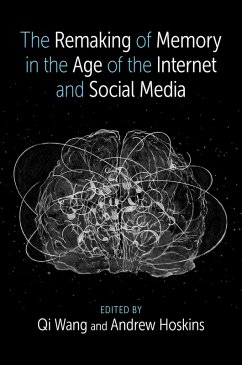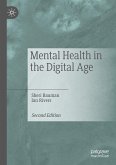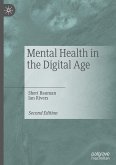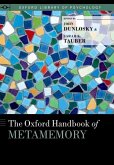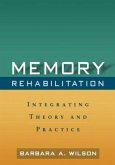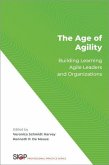The Remaking of Memory in the Age of the Internet and Social Media
Herausgeber: Wang, Qi; Hoskins, Andrew
The Remaking of Memory in the Age of the Internet and Social Media
Herausgeber: Wang, Qi; Hoskins, Andrew
- Gebundenes Buch
- Merkliste
- Auf die Merkliste
- Bewerten Bewerten
- Teilen
- Produkt teilen
- Produkterinnerung
- Produkterinnerung
In this book, the leading international scholars of memory studies synthesize emerging social and cognitive science research on the impact of social media and the Internet on remembering and forgetting. They address methodological issues in studying memory in the digital age and examine whether human memory is being threatened by a shift from a healthy reliance to a dependency on technology. The book aims to build theoretical and empirical foundations for further research to understand the consequences of the Internet and social media for memory representation, expression, and socialization in…mehr
Andere Kunden interessierten sich auch für
![The Psychology of Lying and Misrepresentations The Psychology of Lying and Misrepresentations]() Gianfranco DenesThe Psychology of Lying and Misrepresentations172,99 €
Gianfranco DenesThe Psychology of Lying and Misrepresentations172,99 €![Mental Health in the Digital Age Mental Health in the Digital Age]() Sheri BaumanMental Health in the Digital Age104,99 €
Sheri BaumanMental Health in the Digital Age104,99 €![Mental Health in the Digital Age Mental Health in the Digital Age]() Sheri BaumanMental Health in the Digital Age104,99 €
Sheri BaumanMental Health in the Digital Age104,99 €![Oxford Handbook of Metamemory Oxford Handbook of Metamemory]() Oxford Handbook of Metamemory221,99 €
Oxford Handbook of Metamemory221,99 €![The Amnesias The Amnesias]() Andrew C. PapanicolaouThe Amnesias111,99 €
Andrew C. PapanicolaouThe Amnesias111,99 €![Memory Rehabilitation Memory Rehabilitation]() Barbara A WilsonMemory Rehabilitation59,99 €
Barbara A WilsonMemory Rehabilitation59,99 €![The Age of Agility The Age of Agility]() Veronica Schmidt HarveyThe Age of Agility126,99 €
Veronica Schmidt HarveyThe Age of Agility126,99 €-
-
-
In this book, the leading international scholars of memory studies synthesize emerging social and cognitive science research on the impact of social media and the Internet on remembering and forgetting. They address methodological issues in studying memory in the digital age and examine whether human memory is being threatened by a shift from a healthy reliance to a dependency on technology. The book aims to build theoretical and empirical foundations for further research to understand the consequences of the Internet and social media for memory representation, expression, and socialization in individuals and the implications for the family, community, and society.
Produktdetails
- Produktdetails
- Verlag: Oxford University Press
- Seitenzahl: 352
- Erscheinungstermin: 12. November 2024
- Englisch
- Abmessung: 238mm x 170mm x 28mm
- Gewicht: 640g
- ISBN-13: 9780197661260
- ISBN-10: 0197661262
- Artikelnr.: 72007708
- Herstellerkennzeichnung
- Libri GmbH
- Europaallee 1
- 36244 Bad Hersfeld
- gpsr@libri.de
- Verlag: Oxford University Press
- Seitenzahl: 352
- Erscheinungstermin: 12. November 2024
- Englisch
- Abmessung: 238mm x 170mm x 28mm
- Gewicht: 640g
- ISBN-13: 9780197661260
- ISBN-10: 0197661262
- Artikelnr.: 72007708
- Herstellerkennzeichnung
- Libri GmbH
- Europaallee 1
- 36244 Bad Hersfeld
- gpsr@libri.de
Qi Wang is Joan K. and Irwin M. Jacobs Professor of Human Development, Psychology, and Cognitive Science at Cornell University. She is the author of The Autobiographical Self in Time and Culture (Oxford 2013), and Editor-in-Chief of the Journal of Applied Research in Memory and Cognition . Andrew Hoskins is Interdisciplinary Professor in Social Sciences at the University of Glasgow. He is founding Co-Editor-in-Chief of the Cambridge Journal of Memory, Mind & Media, founding Editor-in-Chief of the Sage Journal of Memory Studies, and founding Co-Editor of the Palgrave Macmillan book series Memory Studies.
* Part I: Introduction
* Chapter 1: The Internet Remaking of Memory: What Are the Important
Questions?
* -Qi Wang and Andrew Hoskins
* Part II: The Digital Self in the Making
* Chapter 2: The Online Extension of Autobiographical Memory: A
Psycho-Cultural Perspective
* -Qi Wang
* Chapter 3: The Forgetting Ecology: Losing the Past Through Digital
Media and AI
* -Andrew Hoskins
* Chapter 4: Sharing personal memories on social media: Motives and
mnemonic consequences
* -Charles B. Stone, Shayla Dockery, and Angelina N. Vasquez
* Part III: The "GOOGLE EFFECT"?
* Chapter 5: Varieties of Offloading Memory: A Framework
* -Evan F. Risko, Megan O. Kelly, Xinyi Lu, and April E. Pereira
* Chapter 6: The Changing Dynamics and Consequences of Memory Retrieval
in the Age of the Internet
* -Benjamin C. Storm, Dana-Lis Bittner, and Jeremy Yamashiro
* Chapter 7: Photography, Digital Media and Technology: Moving from
Effects on Memory to Entanglements in Remembering Activity
* -Tim Fawns
* Part IV: Fake News and False Memories
* Chapter 8: Memories for public events in the Internet age: Fake news,
false memories, and filter bubbles
* -Gillian Murphy, Rebecca Egan, and Ciara M. Greene
* Chapter 9: Continued Influence of Misinformation and the Information
Disorder
* -Li Qian Tay and Ullrich K. H. Ecker
* Chapter 10: Is it possible for justice to be blind when social media
is everywhere?
* -Heather M. Kleider-Offutt and Beth B. Stevens
* Chapter 11: Fake History: Digital Memory and the Specter of National
Socialism in the Capital Riot
* -Jennifer Evans and Brandon Rigato
* Part V: Remembering Through the Individual and the Net
* Chapter 12: Exploring Online Social Interactions in the Remaking of
Memory
* -Suparna Rajaram
* Chapter 13: When Memories Become Data
* -Rik Smit
* Chapter 14: Between Coping and Commodification: Nostalgic Remembering
in a Connected World
* -Katharina Niemeyer and Emily Keightley
* Part VI: From the Person to the Community and Society
* Chapter 15: Hybrid Methodologies for Studying Social and Cultural
Memory in the Post-Digital Age
* -Samuel Merrill
* Chapter 16: Weaponization of Memory: Viruses and Affective Resonance
* Martin Pogacar
* Chapter 17: Understanding Holocaust Memory on Instagram and TikTok
* Noam Tirosh
* Chapter 18: Remembering in pandemic time: A digital museum's 'slow
memory' work
* Karen Worcman and Joanne Garde-Hansen
* Part VII: Concluding Remarks
* Chapter 19: "Don't Panic": Navigating the New World of Memory's
Remaking
* -Louis Klein and Amanda Barnier
* Chapter 1: The Internet Remaking of Memory: What Are the Important
Questions?
* -Qi Wang and Andrew Hoskins
* Part II: The Digital Self in the Making
* Chapter 2: The Online Extension of Autobiographical Memory: A
Psycho-Cultural Perspective
* -Qi Wang
* Chapter 3: The Forgetting Ecology: Losing the Past Through Digital
Media and AI
* -Andrew Hoskins
* Chapter 4: Sharing personal memories on social media: Motives and
mnemonic consequences
* -Charles B. Stone, Shayla Dockery, and Angelina N. Vasquez
* Part III: The "GOOGLE EFFECT"?
* Chapter 5: Varieties of Offloading Memory: A Framework
* -Evan F. Risko, Megan O. Kelly, Xinyi Lu, and April E. Pereira
* Chapter 6: The Changing Dynamics and Consequences of Memory Retrieval
in the Age of the Internet
* -Benjamin C. Storm, Dana-Lis Bittner, and Jeremy Yamashiro
* Chapter 7: Photography, Digital Media and Technology: Moving from
Effects on Memory to Entanglements in Remembering Activity
* -Tim Fawns
* Part IV: Fake News and False Memories
* Chapter 8: Memories for public events in the Internet age: Fake news,
false memories, and filter bubbles
* -Gillian Murphy, Rebecca Egan, and Ciara M. Greene
* Chapter 9: Continued Influence of Misinformation and the Information
Disorder
* -Li Qian Tay and Ullrich K. H. Ecker
* Chapter 10: Is it possible for justice to be blind when social media
is everywhere?
* -Heather M. Kleider-Offutt and Beth B. Stevens
* Chapter 11: Fake History: Digital Memory and the Specter of National
Socialism in the Capital Riot
* -Jennifer Evans and Brandon Rigato
* Part V: Remembering Through the Individual and the Net
* Chapter 12: Exploring Online Social Interactions in the Remaking of
Memory
* -Suparna Rajaram
* Chapter 13: When Memories Become Data
* -Rik Smit
* Chapter 14: Between Coping and Commodification: Nostalgic Remembering
in a Connected World
* -Katharina Niemeyer and Emily Keightley
* Part VI: From the Person to the Community and Society
* Chapter 15: Hybrid Methodologies for Studying Social and Cultural
Memory in the Post-Digital Age
* -Samuel Merrill
* Chapter 16: Weaponization of Memory: Viruses and Affective Resonance
* Martin Pogacar
* Chapter 17: Understanding Holocaust Memory on Instagram and TikTok
* Noam Tirosh
* Chapter 18: Remembering in pandemic time: A digital museum's 'slow
memory' work
* Karen Worcman and Joanne Garde-Hansen
* Part VII: Concluding Remarks
* Chapter 19: "Don't Panic": Navigating the New World of Memory's
Remaking
* -Louis Klein and Amanda Barnier
* Part I: Introduction
* Chapter 1: The Internet Remaking of Memory: What Are the Important
Questions?
* -Qi Wang and Andrew Hoskins
* Part II: The Digital Self in the Making
* Chapter 2: The Online Extension of Autobiographical Memory: A
Psycho-Cultural Perspective
* -Qi Wang
* Chapter 3: The Forgetting Ecology: Losing the Past Through Digital
Media and AI
* -Andrew Hoskins
* Chapter 4: Sharing personal memories on social media: Motives and
mnemonic consequences
* -Charles B. Stone, Shayla Dockery, and Angelina N. Vasquez
* Part III: The "GOOGLE EFFECT"?
* Chapter 5: Varieties of Offloading Memory: A Framework
* -Evan F. Risko, Megan O. Kelly, Xinyi Lu, and April E. Pereira
* Chapter 6: The Changing Dynamics and Consequences of Memory Retrieval
in the Age of the Internet
* -Benjamin C. Storm, Dana-Lis Bittner, and Jeremy Yamashiro
* Chapter 7: Photography, Digital Media and Technology: Moving from
Effects on Memory to Entanglements in Remembering Activity
* -Tim Fawns
* Part IV: Fake News and False Memories
* Chapter 8: Memories for public events in the Internet age: Fake news,
false memories, and filter bubbles
* -Gillian Murphy, Rebecca Egan, and Ciara M. Greene
* Chapter 9: Continued Influence of Misinformation and the Information
Disorder
* -Li Qian Tay and Ullrich K. H. Ecker
* Chapter 10: Is it possible for justice to be blind when social media
is everywhere?
* -Heather M. Kleider-Offutt and Beth B. Stevens
* Chapter 11: Fake History: Digital Memory and the Specter of National
Socialism in the Capital Riot
* -Jennifer Evans and Brandon Rigato
* Part V: Remembering Through the Individual and the Net
* Chapter 12: Exploring Online Social Interactions in the Remaking of
Memory
* -Suparna Rajaram
* Chapter 13: When Memories Become Data
* -Rik Smit
* Chapter 14: Between Coping and Commodification: Nostalgic Remembering
in a Connected World
* -Katharina Niemeyer and Emily Keightley
* Part VI: From the Person to the Community and Society
* Chapter 15: Hybrid Methodologies for Studying Social and Cultural
Memory in the Post-Digital Age
* -Samuel Merrill
* Chapter 16: Weaponization of Memory: Viruses and Affective Resonance
* Martin Pogacar
* Chapter 17: Understanding Holocaust Memory on Instagram and TikTok
* Noam Tirosh
* Chapter 18: Remembering in pandemic time: A digital museum's 'slow
memory' work
* Karen Worcman and Joanne Garde-Hansen
* Part VII: Concluding Remarks
* Chapter 19: "Don't Panic": Navigating the New World of Memory's
Remaking
* -Louis Klein and Amanda Barnier
* Chapter 1: The Internet Remaking of Memory: What Are the Important
Questions?
* -Qi Wang and Andrew Hoskins
* Part II: The Digital Self in the Making
* Chapter 2: The Online Extension of Autobiographical Memory: A
Psycho-Cultural Perspective
* -Qi Wang
* Chapter 3: The Forgetting Ecology: Losing the Past Through Digital
Media and AI
* -Andrew Hoskins
* Chapter 4: Sharing personal memories on social media: Motives and
mnemonic consequences
* -Charles B. Stone, Shayla Dockery, and Angelina N. Vasquez
* Part III: The "GOOGLE EFFECT"?
* Chapter 5: Varieties of Offloading Memory: A Framework
* -Evan F. Risko, Megan O. Kelly, Xinyi Lu, and April E. Pereira
* Chapter 6: The Changing Dynamics and Consequences of Memory Retrieval
in the Age of the Internet
* -Benjamin C. Storm, Dana-Lis Bittner, and Jeremy Yamashiro
* Chapter 7: Photography, Digital Media and Technology: Moving from
Effects on Memory to Entanglements in Remembering Activity
* -Tim Fawns
* Part IV: Fake News and False Memories
* Chapter 8: Memories for public events in the Internet age: Fake news,
false memories, and filter bubbles
* -Gillian Murphy, Rebecca Egan, and Ciara M. Greene
* Chapter 9: Continued Influence of Misinformation and the Information
Disorder
* -Li Qian Tay and Ullrich K. H. Ecker
* Chapter 10: Is it possible for justice to be blind when social media
is everywhere?
* -Heather M. Kleider-Offutt and Beth B. Stevens
* Chapter 11: Fake History: Digital Memory and the Specter of National
Socialism in the Capital Riot
* -Jennifer Evans and Brandon Rigato
* Part V: Remembering Through the Individual and the Net
* Chapter 12: Exploring Online Social Interactions in the Remaking of
Memory
* -Suparna Rajaram
* Chapter 13: When Memories Become Data
* -Rik Smit
* Chapter 14: Between Coping and Commodification: Nostalgic Remembering
in a Connected World
* -Katharina Niemeyer and Emily Keightley
* Part VI: From the Person to the Community and Society
* Chapter 15: Hybrid Methodologies for Studying Social and Cultural
Memory in the Post-Digital Age
* -Samuel Merrill
* Chapter 16: Weaponization of Memory: Viruses and Affective Resonance
* Martin Pogacar
* Chapter 17: Understanding Holocaust Memory on Instagram and TikTok
* Noam Tirosh
* Chapter 18: Remembering in pandemic time: A digital museum's 'slow
memory' work
* Karen Worcman and Joanne Garde-Hansen
* Part VII: Concluding Remarks
* Chapter 19: "Don't Panic": Navigating the New World of Memory's
Remaking
* -Louis Klein and Amanda Barnier

